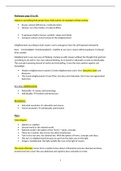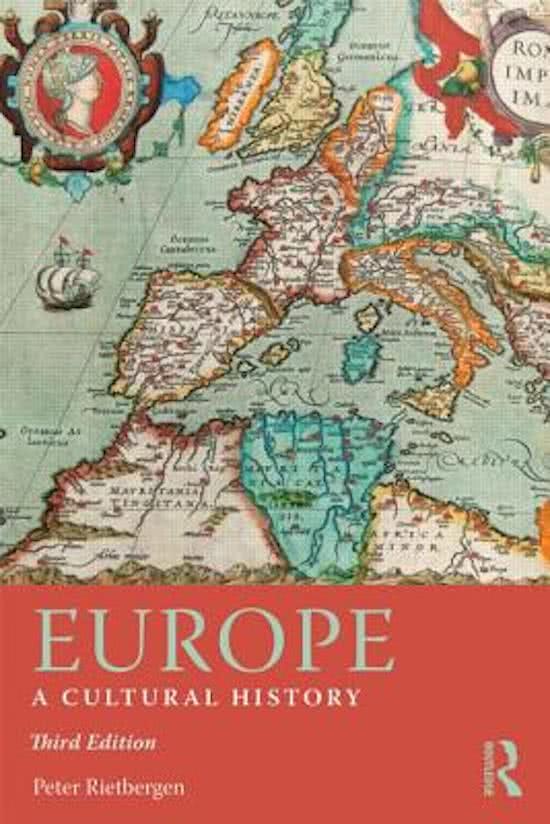Rietbergen page 35 to 68:
Culture is everything that people have, think and do. As members of their society.
Broad: cultural differences, multiculturalism
Narrow: as in the ministry of cultural affairs
It expresses itself in heroes, symbols, values and rituals.
European culture comes forward of the enlightenment
Enlightenment according to kant means: man's emergence from his self-imposed immaturity
Kant : ‘Unmündigkeit’ (minderjarigheid) = inability to use one's reason without guidance (‘Leitung’)
from another
Enlightenment is our own way of thinking. Coming up with answer without the thought that god had
something to do with it. Our own rational thinking. So it stood for rationality as well as individuality.
The concept/reasoning instead of myths and storytelling. It was the mere opinion against real
knowledge.
Modern enlightenment rooted in Greek enlightenment and is from Descartes, Kant and
Rousseau
The Greek enlightenment is from Plato, Socrates and Aristoteles. But it was not appreciated
back then.
Key ideas enlightenment:
Rationality science and technology
Individuality freedom and democracy
Revolutions:
Industrial revolution rationality and science
French revolution individuality and freedom
Plato:
Cave allegory:
Opinion vs. wisdom
Sensual world vs the rational world
Rational world is the sphere of the ‘forms’ = ideas, concepts
There are 2 worlds. One is true, the other treacherous.
Turn to the true one, the rational one. With the sphere of forms, concepts and ideas.
This turn is enlightenment because you go from the dark cave to the light.
Imagery: beeldspraak: the light outside the cave is the light of reason.
The name of Europe comes from a mythical story about a Phoenician princess (Europa) and Zeus,
transformed into a bull. She was abducted and raped by Zeus and taken to Crete.
1
,The Greeks had only a limited idea of the earth they considered the Mediterranean to be the centre
of all lands. The sea who divided Asia and Europe. Africa was black and uncivilized. Asia was more
civilized but politically and militarily unsound. The Greek feared their powerful neighbours. Europe,
aka the Greek sphere of influence. Europe was the most civilized and the strongest region.
It was strong because the civilization was concentrated in free, independent and democratic city
states, which between them maintained a balance of power. These states were sharing the same
language and the same religious and cultural traditions: constituted as Hellas: a cultural community,
a civilization.
The Greek explained how their civilization has been shaped. The prime cause was climate. It was
always warm or cold. It made people active and flexible.
But in Africa and Asia it was even warmer, people were less flexible and more sluggish, indolent,
inactive, easily led by tyrannical kings. They were considered as different and foreign. This was
expressed in their language too. They were babblers, barbarians. Those who don’t speak Greek. This
was all a cover for the real story: it needed to support the Greek independence against the threat
posed by them from their neighbours, especially the east.
Greek coalitions knew how to halt the Persians, but this did not prevent Persian pressure to be
noticeably felt and here the linguistic distinction (taalkundig onderscheid) between Greek and non-
Greek acquired political content, emphasizing (nadruk leggen op) the difference between Greek
freedom and oriental despotism aka absolutism.
The difference between the two comes down to the linguistic distinction but also to the climate. After
all, the Greeks themselves said that because it was warmer in Asia etc., people could more easily be
led by a tyrant (absolutism). The presses were in such a warm country AND were barbarians because
they didn't speak the Greek language and didn't have the Greek culture.
Alexander the great, 356-323Bc, a Macedonian king and educated by Aristotle. He conquered many
lands. His actions were instrumental in diffusing Greek culture to an extent. He brought the essence
of civilization to these regions that he conquered, giving them the Greek languages and the values
cherished by the Greeks.
After alexander the great died his kingdoms were divided between his generals. Yet in these
kingdoms an intriguing mixture emerged of elements from Greek culture AND the pre-existing
traditions of those regions. This has been called: Hellenistic. Hellenism was like a veneer (a thin lay of
wood applied on another material) many adopted both the Greek language, Greek literary and art
combining these with their own Babylonian, Egyptian, Persian or Syrian heritage. It created a mosaic.
The Hellenistic world was soon threatened by the armies of the nascent roman empire which starting
in the 2nd century BC, crossed the borders of the Italian peninsula and within two centuries
conquered all lands surrounding the Mediterranean Sea.
The world of polic (city) was past. The time for cosmopolitan (citizen of the world) had come. A new
culture emerged.
Alexandria became an international port, an intercultural interface, the most prosperous city in the
Mediterranean.
In Alexandria the interface (Koppel) between cultures in this cosmo-polis, where great riches were
stored, the phenomena known as libraries and museums came into existence: cultural institutions
2
,that would become focal points of European civilization as well as centres of tradition and renewal. It
was the great museion: museum, library and university as the same time, which became a fulcrum of
science and learning.
Euclid: he is known as the father of geometry, he wrote his book on mathematics in the
library of Alexandria: Elements
Archimedes: he studied physics and engineering in Alexandria.
The influence of the Etruscans reached into the Celtic world. And the Celtic tribes eventually entered
Italy.
509 BC: Patricians expelled their Etruscan overlords. Rome became an oligarchic republic, ruled by 2
magistrates or consuls. That is a republic ruled by a small elite. Rome as not a democracy of equal
citizens.
Supplying troops and other aid for the wars Rome now waged. Rome began to establish colonies in
strategic positions in conquered areas. In the 5th, 4th and 3th century a process of romanization
began. It was completed in the 2nd century.
Romanization: Rome forced cities to recognize its suzerainty, even if they retained some measure of
internal self-government, provided the ruling elites cooperated that is submitted to Rome’s
demands. (Rome dwong andere steden om hun cultuur (zowel taal als andere elementen) over te
nemen, deden ze dit niet dat zorgde Rome ervoor met grof geweld)
91BC: When the roman empire had divided a lot because of wars that keep going on, Julius Caesar
stepped in and ended the wars. He had risen to political eminence by flaunting his class traditions,
courting the common people by going about the streets, giving them magnificent mock battles in the
amphitheatre and expending largesse on a grand scale.
The roman elite came to admire and absorb the Greek culture.
By the 2nd century the body of electors consisted of 250.000 men. Power lay in hands of the nobles
who continued their oligarchy republic.
Population of Rome was mushrooming because of:
Slaves (prisoners of the wars)
People who migrated to the urbs, including Italian farmers
Because the population of Rome was poor, this showed in the economy of Rome. This led to new
tensions such as the manifest of food supply.
Strong institutional structure, with an emperor cult: (The tradition of divine (godlike) rulers)
3
, The capstone of the system was the emperor. That elite glorified the emperor. They were treated as
gods.
Everyone had to honour and obey the emperor, but they also had to respect the basic principles of
the empire as codified in its legal system. This made sure that all free persons were treated equally
under uniform laws. The legal system was extended. This provided the foundation for a juridical-
institutional pyramid with the emperor at its peak: in the administration of justice, the emperor was
the final court of appeal.
Important for the cohesion (samenhang) of the roman empire: a career was possible for all citizens
But not all inhabitants of the empire were citizens. Status and power were mainly determined by
wealth and the prestige a person acquired by adapting to the culture of the elite via the paideia
Citizenship linked to the paideia ideal:
If one was a roman citizen, you could become a member of an elite.
The paideia was the basis of the Greek cultural and especially moral philosophical texts and
had been adopted by the roman upper class.
It basically means that one had learned to read, write and speak Latin;
Being educated, being civilized, based on Greek texts
The paideia was open to all free people living within the borders.
In the culture of ancient Greece the term paideia referred to the rearing and education of
the ideal member of the polis or state. It incorporated both practical, subject-based
schooling and a focus upon the socialization of individuals within the aristocratic order of the
polis
Rome is the heir to the culture of the eastern Mediterranean:
Rome symbolically made itself the heir to the culture of thee aster Mediterranean but also claimed
to have created a new civilization.
This happened because of a book: Odyssey. Aeneas, son of the royal house of troy escaped home and
fled westward, where he begot ( verwekte) the first romans.
Fall of the roman empire:
Barbarians
Coruption and week leadership
Military spending and debt
Political division
Rise of christianity different set of virtues ( deugden)
Rietbergen p. 99 – 123
4






